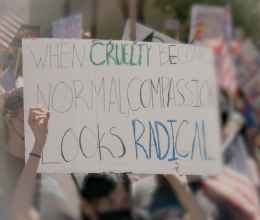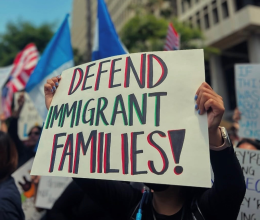In a major decision, a U.S. district court has ruled that federal officials must provide representation for two men with severe mental disabilities while they fight their deportation cases.
U.S. District Judge Dolly Gee’s decision Wednesday also guarantees they must be afforded a bond hearing to determine whether they should remain in detention.
Judge Gee’s decision marks one of the first instances in which a federal court has required the government to provide representation for any individual in immigration proceedings.
“The court’s well-reasoned order recognizes what common sense should already tell us: people with serious mental disabilities cannot get a fair hearing without representation in immigration court,” said Ahilan Arulanantham, an attorney with the American Civil Liberties Union of Southern California.
In March, the ACLU/SC, the ACLU of San Diego & Imperial Counties, Public Counsel in Los Angeles and the Casa Cornelia Law Center in San Diego filed suits in U.S. District Courts in Southern California on behalf of Jose Antonio Franco, 30, and Guillermo Gomez Sanchez, 48. Because of their profound mental disabilities, both men had spent years in immigration detention without legal assistance to fight their cases but were released just days after the suit was filed.
The groups then obtained the assistance of Sullivan & Cromwell and moved to transform the case into a class action on behalf of detainees with mental disabilities in November. The lawsuit alleges federal officials have deprived these immigrants of their Constitutional right to due process and violated federal anti-discrimination laws designed to protect people with disabilities.
Judge Gee’s ruling, which was temporarily filed under seal to protect private medical information, requires the government to obtain representation for the two individuals who are part of the class, both of whom face imminent deportation if not given assistance. The ruling also requires that these individuals be allowed a hearing with representation --- to determine whether any further detention is legal.
“Unfortunately, the stories of these two men are not unique,” said Talia Inlender, an attorney with Public Counsel. “Their plight is the direct result of a system that lacks procedures to address the needs of those with serious mental disabilities.”
Wednesday’s decision will ensure these immigrants who are too mentally disabled and too poor to pay for lawyers get a fair hearing and are not simply locked up and forgotten.
“Judge Gee’s thorough opinion is a first step in ensuring that the rights of those who are rendered helpless by their mental illnesses are not ignored,” said Michael Steinberg, a partner with Sullivan & Cromwell.
On any given day, some 37,000 immigrants are detained by immigration officials. While the exact number of detainees with severe mental disabilities is unclear, some reports estimate that at least two percent of the immigrants detained by immigration authorities nationwide might have a serious mental disability.
Unlike our nation’s criminal justice system, the immigration system has no standard procedures to resolve cases against detainees with mental disabilities who are not competent to understand the proceedings against them.
The litigation is currently on-going. Counsel in the case includes the ACLU/SC, Sullivan & Cromwell, Public Counsel, the Northwest Immigrant Rights Project, the ACLU’s Immigrants’ Rights Project, the ACLU of San Diego & Imperial Counties, and Mental Health Advocacy Services Inc.

